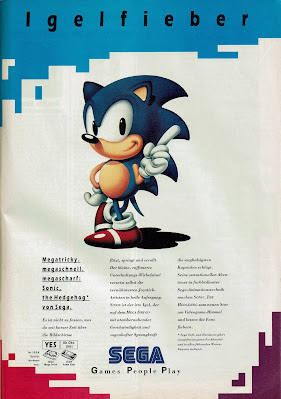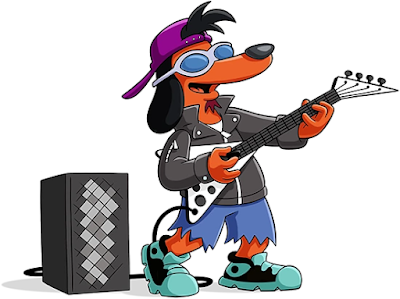I admit it: I'm not up to date on the Sonic Fandom. My familiarity with the character is limited to the original Genesis games, although I've certainly known people around my own age for whom the name "Sonic the Hedgehog" meant the animated series, comics, or (heaven help us).. newer video games. There have been the recent movies keeping the character in the public eye, not to mention Sega embracing fan creations using the old 2D format though Sonic Mania alongside slicker, modern titles like Sonic Forces. Nonetheless, I've been spending a lot of time with the character lately - thanks to a couple of miraculous devices, I have the complete Sega Genesis library at my fingertips and I've been slowly working my way thorough the classics. Things are stressful for just about everyone these days, and being able to quickly pull up a something colorful and energetic for just a few minutes provides great comfort and relief. I beat the first Sonic the Hedgehog (with the prodigious use of save states)a few months ago and have since been picking my way around the second.
It might seem counterintuitive that these games can be comforting. Besides their still-unmatched speed and frenetic energy, not to mention the sheer sensory assault that arcade-inspired games provide (although, as we've discussed before, that in itself can be soothing), there's the titular Hedgehog himself - the archetypal 90s attitudinal protagonist. Of course, with no cutscenes or dialogue, the effect is more subtle, conveyed through animation and box art. But it's still there: even in the very first game, Sonic would look directly at the camera and start tapping his foot if the player stopped moving for more than a couple seconds (another example of the fascinating player/character/medium interaction to be explored in future posts). In a way, his very presence is a declaration of iconoclasm: with the exception of Dr. Robotnik (or Dr. Eggman, depending on your region), no one else in Sonic's world has a distinct appearance. There are the robotic enemies, but once Sonic destroys their cybernetic shells, the animals trapped within them reveal themselves to be one of a few basic types. Simply by his presence, then, Sonic stands out, but, unlike Mario (for instance) he isn't an interloper in the setting. This world is Sonic's home, and he is unique within it. The character is defined a little more clearly in Sonic 2 simply through the addition of Miles "Tails" Prower as a frame of reference, his wide-eyed naiveté standing out against Sonic's knowing smirk. Tails shows us that it's not merely Sonic's size (relative to the other animals) and unique appearance that reveals him going against the grain, but his awareness, his excitement, his hunger for danger. It may not be the most "x-treme" of attitudes, but it resonates, as the character's continued popularity shows, in a way that his imitators utterly failed to.
The Itchy & Scratchy & Poochie Show is a Simpsons episode that has fascinated me since it first aired in 1997. It's a complex, conflicted (and likely very personal) episode, simultaneously decrying the soulless corporatism of television while also speaking candidly about the love and care creators put into the medium... all while mocking the aforementioned 90s trend of characters with "attitude" and the fickle nature of fandom... phew! Poochie's "attitude" was somewhat more defined than Sonic's but mostly amounted to a checklist character traits associated with the concept and being called "one outrageous dude" onscreen. Closer to home, Poochie's omnipresence and marketability was decidedly reminiscent of the way Bart was treated in the early years, something I'm sure was quite intentional. Bart, however, actually rebelled against authority, earning his "cool outsider" status (for the viewers, anyway.) Poochie, on the other hand, is simply described to both the real-life and in-universe audiences (through song, at least). While I certainly understand what they were going for, it's kind of a pity that we couldn't see Poochie actually engage with the Itchy & Scratchy cinematic universe... like us, he never even got to the Fireworks Factory! I can't be the only one curious to see how the Kung-Fu Hippie from Gangsta City reconciled all those identities, let alone how they would have manifested. Perhaps the Simpsons creators were too clever for their own good, making a joke character potentially interesting, or perhaps I'm simply starved for some of that manic 90s energy in a character completely lacking in the winking post-Whedon self-awareness that's the standard now. In any case, Poochie never developed past his first appearance and was quickly killed off (on the way back to his home planet). They wanted to mock television's default (at the time) return to a status quo, both in the fictional Itchy & Scratchy Show and in The Simpsons itself, with Homer's brief career as a voice actor ending abruptly and Poochie's in-universe stand-in Roy (like I said, it's a surprisingly complex episode) leaving suddenly.
There's an inherent paradox in any kind of "outsider" character created within capitalism, particularly with an eye towards marketability. They are, by their very nature, part of the system they're supposed to be rebelling against (should the creators even bother with that part). So why am I feeling a draw to these characters today? Sonic, at least, is clearly fighting a noble battle against individuals being turned, quite literally, into automata, something with which we can easily identify, regardless of its origin.The real-world equivalents are actively crushing individuality and diversity, all the while declaring that they're the ones being discriminated against (a twist even Dr. Robotnik couldn't have thought up). Sonic may be a corporate mascot, but he's also been claimed and reclaimed to a degree that few other characters have - he's escaped the Poochie Trap, being placed in scenarios far beyond those in which he was first imagined. It's no coincidence that teenagers feel a particular connection with the character, including queer and neuroatypical kids. In any incarnation, Sonic is a weirdo who doesn't fit in, and, in an era where our cinematic heroes not only fight to maintain cultural hegemony and the status quo and, but productions literally require the approval of the American military, any kind of rebellion feels refreshing, even the hokey and forced.
Is there room in this rediscovery for Poochie? You know... maybe. In his case, "poorly-defined" can also been seen as a "blank canvas," and as a 90s kid, I consider nunchucks to be a far more effective weapon than they probably are - so I'd definitely want him on my side in the Revolution. Could his "always recycle... to the EXTREME!" message be updated for climate change? It might be time to revisit this proactive paradigm. Welcome to the fight, Poochie... now, let's go liberate the Fireworks Factory.
- B
Send comments and questions to neversaydice20@gmail.com or Tweet them @neversaydice2.



